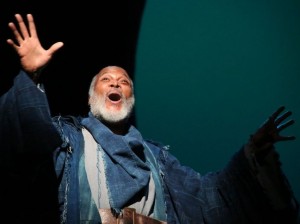Pericles, the first of Shakespeare’s late romances, is the only play not in the First Folio. Most critics agree that the first two acts are by someone else, possibly the work of George Wilkins, who wrote the “prose narrative” on which the play is based, and from which Fiasco Theater’s galloping production sometimes borrows. But the last three acts are the Bard, and this play, even though Ben Jonson called it “a mouldy tale,” has proven resilient.
Shakespeare’s Game of Thrones
The first of Shakespeare’s quartet of late romances, Pericles (1608) is certainly one of the least known of his plays. Most scholars agree that the first two acts are by lesser light George Wilkins. Yet the production at Theatre for a New Audience is so engaging and visually sumptuous that one can only wonder it’s not a staple of the canon.
The opportunity to notch Pericles, the 35th of Shakespeare’s 37 plays that he has directed, has brought British director Trevor Nunn to Brooklyn. And Nunn’s genius in handling the notoriously corrupt text has pulled it all together, even though the main story splits into two and then three parts as the hapless Pericles endures loss and separation from his family.
Antioch is where Wilkins sets the plot in motion. There Christian Camargo’s prince, wooing the daughter of King Antiochus (Earl Baker Jr.), must solve a riddle to win her hand. Otherwise, his head may end up with others sitting atop cypress-draped spears. But the answer exposes a deadly secret, and Pericles flees the city. Unable to settle safely in Tyre, Pericles hands the reins to Helicanus (Philip Casnoff), his trusted adviser, and wanders around the Mediterranean. He has numerous setbacks and adventures, including marriage to Gia Crovatin’s elegant, demure Thaisa (a princess). They have a daughter, Marina, named by Pericles after Thaisa dies in childbirth, and he leaves her to be raised by friends as he heads to reclaim his throne. Betrayal and misfortune follow, and, believing Marina dead, he withdraws into misery. But, as Shakespeare turns a corner from his tragedies to the life-affirming romances, miracles do happen.
It all sounds pretty sappy, but it’s as spirited as Game of Thrones, what with jousts, shipwrecks and even pirates. Using gossamer, pleated tunics and gowns, costume designer Constance Hoffman creates distinct Levantine kingdoms: white for Pentapolis; black for Tarsus; indigo in Tyre; and in Mytilene, bright, Arabic-style clothes. The set by Robert Jones features an upstage wall with a large circle with panels that open to reveal varied terrains: a desert, perhaps, or, in a stunning coup de théâtre, a huge gray moon with the goddess Diana.
The story is based on a Renaissance novel by John Gower, who appears as the Chorus, eagerly spinning out the tale. Raphael Nash Thompson invests him with authority and sometimes a rich baritone, as he sings portions of the verse to an extensive score provided by Shaun Davey and played by 10 musicians from the PigPen Theatre Company, several of whom double in the small roles.
Nunn takes other liberties with the text, drawing on Wilkins’s 1608 novelization of the play for information to smooth out bumps. A nifty scene is interpolated when the surrogate Helicanus tries to quiet the demands of other lords for an explanation where their prince has gone, in front of a visitor that Helicanus suspects is an assassin. It’s a well-written scene, but it’s not from the play. One can sense Nunn’s sure hand in even the smallest details—when that same assassin, Oberon K.A. Adjepong’s Thaliard, arrives in Tyre, he looks around and says, “So this is Tyre, and this the court,” with a snort of disgust and an air of superiority.
For the most part, the actors handle the language with skill. Although Pericles is, like Job, more victim than agent of his destiny, Camargo speaks the verse confidently and is as heroic as the part allows, growing from callow youth to a man chastened by life’s hardships.
The more colorful roles are seized with relish. John Rothman as King Simonides is a merry monarch, trying to get his daughter, Thaisa, and Pericles to pair up. The strapping Ian Lassiter as Lysimachus, governor of Mytilene, starts off as a randy patron of the brothel where Marina is determined to keep her chastity and charts a touching transformation to her ally and eventual suitor. Will Swenson is a well-spoken Cleon, the starving King of Tarsus, whose life and country Pericles saves. Yet years later Cleon becomes morally hamstrung after his wife, Dionyza (Nina Hellman), plots Marina’s murder.
Not all is perfect. Patrice Johnson Chevannes as the Bawd misses a lot of the humor in the part. And the Marina of Lilly Englert is a major drawback. Englert radiates innocence and purity, but when she speaks, she sucks air audibly before every line and sometimes between phrases; the character sounds like she’s having an asthma attack. Her irritating aspirations mar some key moments, including the great reconciliation scene with Pericles.
On the whole, though, this rarely staged romance is a feast for the eyes and the ears, a gem from a master Shakespearean director that you won’t want to miss.
Trevor Nunn's production of Pericles runs through April 10 at Theatre for a New Audience at the Polonsky Shakespeare Center (262 Ashland Place between Rockwell Place and Ashland Place) in Brooklyn. Evening performances are at 7:30 p.m. on Tuesday-Saturday, and matinees are at 2 p.m. on Saturday and Sunday. Tickets $75-$85 and may be ordered by calling OvationTix at 866-811-4111.










